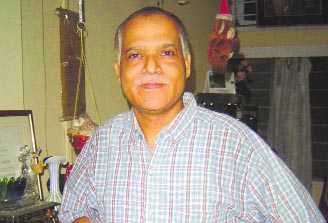Books coming out of the IAS-IPS stable are nothing new. We have IPS officers reinterpreting Kabir's dohas, writing memoirs and churning out works of fiction. It's perhaps a classic example of the keypad being mightier than the gun or at least more alluring than the gun. It's another story that many of these books stay where they are destined to: in the publishers' warehouses.
The one that clicked with me was Kula Saikia's Assamese short story collection, Akashar Chabi Aru Ananya Galpa, which can be roughly translated as 'The Painting of the Sky and Other Stories.' This book has bagged the Sahitya Akademi Award in 2015. Kula Saikia doesn't belong to the IPS-turned-author category. It is difficult to tell who is more popular: Kula Saikia, the police officer, relentlessly fighting witch-hunting prevalent in Assam or Kula Saikia who has gifted Assam 14 short stories collections and a novel, besides poetry collections.
When he walks up the stage in February to receive the honour from the President, it would be the writer in him that will be in the forefront, his job profile as ADGP (Economic offence and investigation), Assam, would only be an appendage. “My job gives me the opportunity to deal with all kinds of people,” he says. It's his understanding of the mental journey that one goes through in life. Most of his stories do not tread the traditional line of a structured plot, a climax and a conclusion, but the to-and-fro journey of the mindscape, the inter-winding of the past with the present.
After I left Assam for Aligarh, I developed an aversion for two things: onion and guava. Onion, because at my hostel dining room in Abdullah Hall, AMU, where I was doing my graduation, I was often teased for mispronouncing piyaz as 'piaj'. Guava, because the fruit seller would laugh at me for calling amrudh as amdhur! Since I couldn’t get the names correct, I decided to give up on both. Decades later, in my adopted state Punjab, I still attract giggles for getting my gender mixed up when I speak Hindi.
Well, it was no longer a laughing matter when Assam CM Tarun Gogoi commented on the domination of Hindi-speaking people in the state BJP. He hit out at the party for changing Srimanta Sankardev into Baba Shankar Deo and his one-time trusted lieutenant Himanta Biswa Sharma being called Simanta Bishwa Sharma. Gogoi may not have been politically correct, but yes, we too are touchy about mispronunciation and wrong diction. After all, the language did not come easy to us.
In April 1960, a proposal by the Assam Pradesh Congress Committee to declare Assamese as the official language caused tension between the Bengali-speaking people in the Barak valley and the Assamese-speaking people in the Brahmaputra Valley, leading to violence. A Bill seeking to legalise Assamese as the sole official language was passed by the Assam Assembly on October 24, 1960. Thus, Assamese became the one and only official language of the state.
After Gogoi, the Hindi-Assamese row got an extreme twist when the ULFA (Independent) faction banned performance of Hindi songs during Rongali Bihu which falls in April. The outfit has warned Assamese artistes against performing even their own Bollywood hits at any public function. The ULFA has a point. Rongali Bihu is one occasion that bridges the generation gap, pulling all age groups to enjoy the week-long celebrations together. Imagine sitting with your parents and elderly people at a Bihu function and having to watch someone on stage gyrating to Kundi na kharkao raja, Sidhe andar aao raja…
Looks like the state BJP is not envious of AIUDF just for its 35% sure-shot Muslim vote bank alone but also the huge wealth its convener Badruddin Ajmal possesses. A BJP worker rues the fact that while Badrudddin’s party is wooing non-Muslim votes by donating huge sums of money, BJP workers feel lucky if they manage to get a cup of tea and biscuits for working day and night for the party. But, then, the worker explains: Ajmal won’t get the Hindu votes even if he spends money for their development. He would get the Musilm votes even if he didn’t do anything for them. That's the politics of religion and religion of politics.
parbina@tribunemail.com
Unlock Exclusive Insights with The Tribune Premium
Take your experience further with Premium access.
Thought-provoking Opinions, Expert Analysis, In-depth Insights and other Member Only Benefits
Already a Member? Sign In Now










